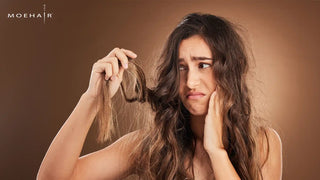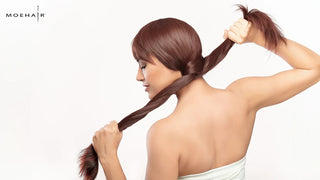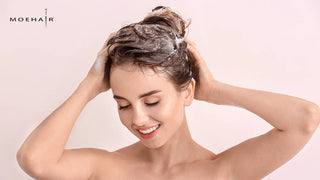 Table of contents
Table of contents
If you've ever scrolled through beauty reviews on TikTok or other social forums, you’ve probably heard someone ask, "Is sulfate bad for your hair?" The short answer is that it's not entirely black and white. While sulfates have been used in shampoos for years, there’s still a lot of confusion around whether they’re truly harmful or if the backlash is a bit overblown.
In this blog, we will explore the facts and myths, helping you decide if switching to a sulfate-free shampoo and sulfate-free conditioner is right for you.
What Are Sulfates and Why Are They Used in Shampoos?
Sulfates are a group of chemicals commonly found in personal care products, especially shampoos and soaps. These compounds are surfactants, which means they help to create lather and act as cleansing agents. They work by breaking down and removing oils, dirt, and buildup from your scalp and hair.
Sulfates are excellent at cleansing, but they can also strip your hair of its natural oils, which can lead to dryness and irritation, especially if you have sensitive, curly, or color-treated hair. Over time, this can lead to issues such as frizz, dryness, and even damage to your hair strands.
Are Sulfates Bad For Hair?
Sulfates can be drying or irritating for certain hair types and scalp conditions, but they're not inherently bad for everyone. If you have straight, oily hair or don’t use many products or color treatments, sulfates may not cause any noticeable harm. But if your hair is curly, dry, or color-treated, sulfates might not be the best choice for your hair care routine.
Here’s a breakdown of how sulfates can affect different hair types:
- Dry or Curly Hair: Sulfates can leave your hair feeling dry, frizzy, and more prone to damage because they strip away natural oils that curly hair needs to stay hydrated and defined.
- Color-Treated Hair: If you have color-treated hair, sulfates can speed up the fading process by stripping away the color and moisture. Over time, this could lead to dull, lackluster hair.
- Sensitive Scalps: If you have a sensitive scalp or conditions like eczema, sulfates can be irritating and make things worse by drying out the scalp.
When Should You Avoid Sulfates?
It’s best to avoid sulfates if you have:
- Sensitive Skin or Scalp: Sulfates can strip moisture, leading to dryness and irritation.
- Rosacea: Sulfates can trigger flare-ups, affecting both your face and scalp.
- Eczema or Contact Dermatitis: These conditions can worsen with the drying effects of sulfates.
- Allergies: If you're allergic to sulfates, you may experience redness, rashes, swelling, or itchiness.
Myths vs. Facts About Sulfates
There’s a lot of misinformation out there regarding sulfates. Let’s clear up some common myths:
Myth 1: All Sulfates Are Toxic
Fact: Sulfates are generally considered safe in small amounts. The primary concern with sulfates is that they can be drying and irritating, particularly for individuals with sensitive skin or hair.
Myth 2: The More Lather, the Better the Cleanse
Fact: Just because a shampoo lathers a lot doesn’t mean it’s cleansing better. Lather is simply a byproduct of sulfates and doesn’t correlate to better cleaning. Many sulfate free shampoos can effectively clean your hair without creating a huge frothy mess.
Myth 3: Sulfate-Free Shampoo Doesn’t Work for Oily Hair
Fact: Sulfate-free shampoos can work wonders for oily hair. They help cleanse the scalp without stripping essential oils, preventing an overproduction of oil.
Benefits of Sulfate-Free Shampoos
Switching to a sulfate-free shampoo can bring numerous benefits.
1. Curly Hair Loves Sulfate-Free Shampoo: Curly hair thrives with sulfate-free shampoos because they help maintain moisture and reduce frizz.
2. Oily Hair Benefits from Sulfate-Free Shampoos: It’s a common misconception that sulfate-free shampoos don’t work for oily hair. In reality, they can actually help balance oil production.
3. Color-Treated Hair Stays Vibrant Longer: Sulfate-free shampoos are gentler on color-treated hair, helping your color last longer. If you’ve invested time and money into a hair color, you’ll want a sulfate-free shampoo to protect your hue from fading too quickly.
How to Transition to Sulfate-Free Products?
If you’re making the switch to sulfate-free hair care, it may take a little time for your hair and scalp to adjust. Look for products labeled as:
- Sulfate-Free
- Color-Safe
- Gentle Cleanse or Moisturizing
These products are formulated to clean and hydrate without stripping away essential oils. If you’re ready to take the plunge, Moehair USA offers a variety of sulfate-free conditioners and shampoos tailored to different hair types.
Ultimately, whether sulfates are bad for your hair depends on your hair type and personal preferences. For those with dry, curly, color-treated, or sensitive hair, sulfate-free products can make a huge difference in the overall health and appearance of your hair. Explore Moehair USA’s shampoos, conditioners, and other sulfate free hair products to help you achieve healthier, more manageable hair, without compromising on quality.
FAQs
Q1. What are sulfates and why are they added to shampoos?
Sulfates are cleansing agents that help remove dirt, oil, and buildup from your hair and scalp. They also create that rich, foamy lather most people associate with clean hair.
Q2. Why should I choose a sulfate-free shampoo?
Sulfate-free shampoos are gentler on your hair and scalp. They help maintain natural moisture, preserve hair color, and prevent dryness or irritation.
Q3. Will sulfate-free shampoos clean my hair properly?
Yes! Modern sulfate-free formulas are specifically designed to cleanse effectively without stripping the skin of essential oils. They remove dirt and buildup while keeping your strands hydrated and manageable.
Q4. Can sulfate-free shampoos help with frizz?
Absolutely. Sulfate-free shampoos help retain your hair’s natural oils, reducing dryness and frizz while enhancing smoothness and shine.
Q5. Do sulfate-free shampoos lather less?
They usually produce less foam, but that doesn’t mean they’re less effective. Lather doesn’t determine how well a shampoo cleans; it’s simply a byproduct of sulfates.
Q6. How can I tell if a shampoo is sulfate-free?
Check the ingredient list or look for terms like “Sulfate-Free”, “Gentle Cleanse”, or “Color-Safe” on the label. Moehair USA’s sulfate-free shampoos are clearly marked and formulated to protect all hair types.
Q7. How long does it take to see results after switching to sulfate-free shampoo?
Your hair may take a few washes to adjust. Initially, it might feel different because your scalp is rebalancing its natural oils. Within two to three weeks, you’ll notice softer, shinier, and more manageable hair.
Q8. Are sulfate-free shampoos good for colored or treated hair?
Yes. They help color last longer and prevent fading. If you invest in salon color or keratin treatments, a sulfate-free shampoo will help maintain your results.
Q9. Which Moehair USA shampoos are sulfate-free?
All Moehair USA shampoos, including Color Alive, Protein Infused, Clarifying, and Hi-Vibes Vegan Aura, are sulfate-free and formulated to suit different hair concerns while keeping your strands healthy and vibrant.
How we reviewed this article:
Our experts continually monitor the fashion and beauty space, and we update our articles when new information becomes available.
-
Current Version
-
October 10, 2025
Written and Edited By -
Utsav Baghel is a seasoned researcher with over five years of industry experience in technical and academic writing.






















